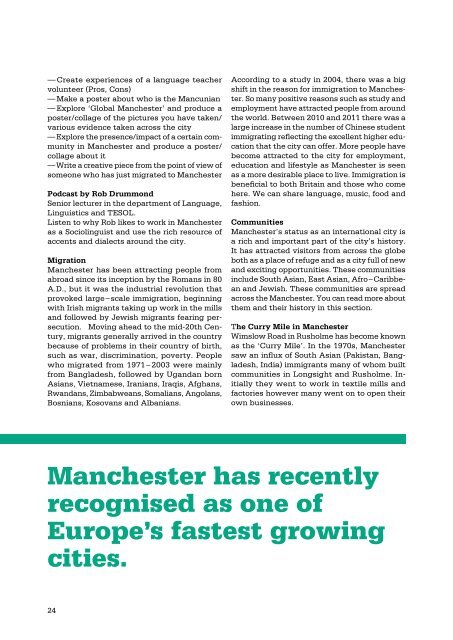THFMagazine2018/19
You also want an ePaper? Increase the reach of your titles
YUMPU automatically turns print PDFs into web optimized ePapers that Google loves.
The Home Magazine 2018.<br />
— Create experiences of a language teacher<br />
volunteer (Pros, Cons)<br />
— Make a poster about who is the Mancunian<br />
— Explore ‘Global Manchester’ and produce a<br />
poster/collage of the pictures you have taken/<br />
various evidence taken across the city<br />
— Explore the presence/impact of a certain community<br />
in Manchester and produce a poster/<br />
collage about it<br />
— Write a creative piece from the point of view of<br />
someone who has just migrated to Manchester<br />
Podcast by Rob Drummond<br />
Senior lecturer in the department of Language,<br />
Linguistics and TESOL.<br />
Listen to why Rob likes to work in Manchester<br />
as a Sociolinguist and use the rich resource of<br />
accents and dialects around the city.<br />
Migration<br />
Manchester has been attracting people from<br />
abroad since its inception by the Romans in 80<br />
A.D., but it was the industrial revolution that<br />
provoked large – scale immigration, beginning<br />
with Irish migrants taking up work in the mills<br />
and followed by Jewish migrants fearing persecution.<br />
Moving ahead to the mid-20th Century,<br />
migrants generally arrived in the country<br />
because of problems in their country of birth,<br />
such as war, discrimination, poverty. People<br />
who migrated from <strong>19</strong>71 – 2003 were mainly<br />
from Bangladesh, followed by Ugandan born<br />
Asians, Vietnamese, Iranians, Iraqis, Afghans,<br />
Rwandans, Zimbabweans, Somalians, Angolans,<br />
Bosnians, Kosovans and Albanians.<br />
According to a study in 2004, there was a big<br />
shift in the reason for immigration to Manchester.<br />
So many positive reasons such as study and<br />
employment have attracted people from around<br />
the world. Between 2010 and 2011 there was a<br />
large increase in the number of Chinese student<br />
immigrating reflecting the excellent higher education<br />
that the city can offer. More people have<br />
become attracted to the city for employment,<br />
education and lifestyle as Manchester is seen<br />
as a more desirable place to live. Immigration is<br />
beneficial to both Britain and those who come<br />
here. We can share language, music, food and<br />
fashion.<br />
Communities<br />
Manchester’s status as an international city is<br />
a rich and important part of the city’s history.<br />
It has attracted visitors from across the globe<br />
both as a place of refuge and as a city full of new<br />
and exciting opportunities. These communities<br />
include South Asian, East Asian, Afro – Caribbean<br />
and Jewish. These communities are spread<br />
across the Manchester. You can read more about<br />
them and their history in this section.<br />
The Curry Mile in Manchester<br />
Wimslow Road in Rusholme has become known<br />
as the ‘Curry Mile’. In the <strong>19</strong>70s, Manchester<br />
saw an influx of South Asian (Pakistan, Bangladesh,<br />
India) immigrants many of whom built<br />
communities in Longsight and Rusholme. Initially<br />
they went to work in textile mills and<br />
factories however many went on to open their<br />
own businesses.<br />
Manchester has recently<br />
recognised as one of<br />
Europe’s fastest growing<br />
cities.<br />
The curry mile features a rich and diverse range<br />
of cuisines reflecting the wide range of people<br />
who have immigrated to Manchester. It has<br />
been a focal point of Manchester in the late<br />
<strong>19</strong>70s by which point many of the predominantly<br />
Pakistani immigrants had settled down in the<br />
city. It is thought to be the largest concentration<br />
of South Asian restaurants outside of the<br />
sub – Indian content.<br />
Chinatown<br />
Manchester’s Chinatown is at the heart of city<br />
and is the third biggest Chinatown in Europe<br />
reflecting Manchester’s thriving Chinese/Asian<br />
community.<br />
After the Second World War, Manchester saw<br />
an influx of Chinese immigrants and in <strong>19</strong>48, the<br />
first Chinese restaurant opened in Manchester.<br />
There is an impressive arch that was erected<br />
in <strong>19</strong>87; just one year after Manchester was<br />
twinned with the city of Wuhan. The area is<br />
home to many restaurants, stores, bakeries and<br />
there is even a Chinese Art Centre. In 2013, the<br />
Bank of East Asia opened its first Manchester<br />
branch here reflecting the area’s reputation as a<br />
place of great opportunity. It is host to Chinese<br />
businesses but many other East Asian overseas<br />
businesses including Thai, Japanese, Nepali,<br />
Vietnamese, Singaporean and Malaysian.<br />
Jewish Community<br />
Manchester has had a notable Jewish community<br />
since the late 18th century. The first synagogue<br />
was a rented room, now the city is home<br />
to many prominent synagogues. In the early<br />
<strong>19</strong>th Century, immigrants from Germany and<br />
Holland joined many of whom were Jewish.<br />
Many found homes in Manchester’s semi-rural<br />
suburbs such as Cheetham Hill. Many places<br />
such as Prestwich still have a vibrant Jewish<br />
community today and Manchester even has<br />
its own Jewish Museum featuring stories from<br />
Manchester’s Jewish community.<br />
Manchester Irish Community<br />
Manchester’s Irish community play an important<br />
part in the history of the city. In 1841 a tenth of<br />
the city’s population was Irish living in a slum<br />
area in Ancoats known as ‘Little Ireland’ however<br />
this still offered a better life for many Irish immigrants,<br />
whom had become impoverished due<br />
to the Potato famine. By the early 20th century,<br />
the Manchester Irish were very well integrated<br />
especially in comparison to the Welsh or Scots.<br />
This can be attributed to various factors such<br />
as higher numbers, distinctive region, history<br />
and cultural traditions. Manchester has its own<br />
Irish World Heritage Centre, which is a major<br />
conference and events venue and major hub<br />
for the Irish community in Northwest England<br />
and offers a diverse programme of traditional<br />
cultural activities covering Irish dance, music,<br />
and Irish language groups. Find out more here.<br />
The Manchester Irish Festival is also the biggest<br />
in the UK and among the biggest in the world.<br />
Afro – Caribbean Community<br />
In the <strong>19</strong>50s and <strong>19</strong>60s, Britain saw an influx in<br />
immigrant from West Indies. Moss Side became<br />
a key area of black settlement however many<br />
of them did face adversity due to racism and<br />
social deprivation. Many people found hope and<br />
strength through the church and formed many<br />
of their own successful establishments. Today<br />
many Afro-Caribbean residents still reside in<br />
Moss Side but the area has been regenerated<br />
and the area was even featured in the Guardian’s<br />
Let’s Move To series. Since <strong>19</strong>72 Manchester<br />
has also been host to an annual Caribbean<br />
Carnival celebrating the rich and diverse culture<br />
the Caribbean has to offer.<br />
Manchester as a Place of Refuge<br />
From the earliest points in history, Manchester<br />
has been a place of refuge for many immigrants<br />
whom have had to flee their own countries to<br />
find a place of safety. Charities such as Refugee<br />
Action have supported those in need from Vietnamese<br />
refugees in <strong>19</strong>81 to helping support<br />
Syrian refugees today. Greater Manchester is<br />
home to one in four Asylum seekers in the UK<br />
and there are continued effort to support and<br />
home refugees whom are an important part of<br />
the community. More information can be found<br />
here and here.<br />
Culture<br />
Culture is a way of life of a group of people.<br />
Culture is the characteristics and knowledge<br />
of a particular group of people, encompassing<br />
language, religion, cuisine, social habits, music<br />
and arts. Manchester has been one of the<br />
country’s major cultural cities. Indeed in many<br />
senses, it has been considered after London to<br />
24<br />
25



